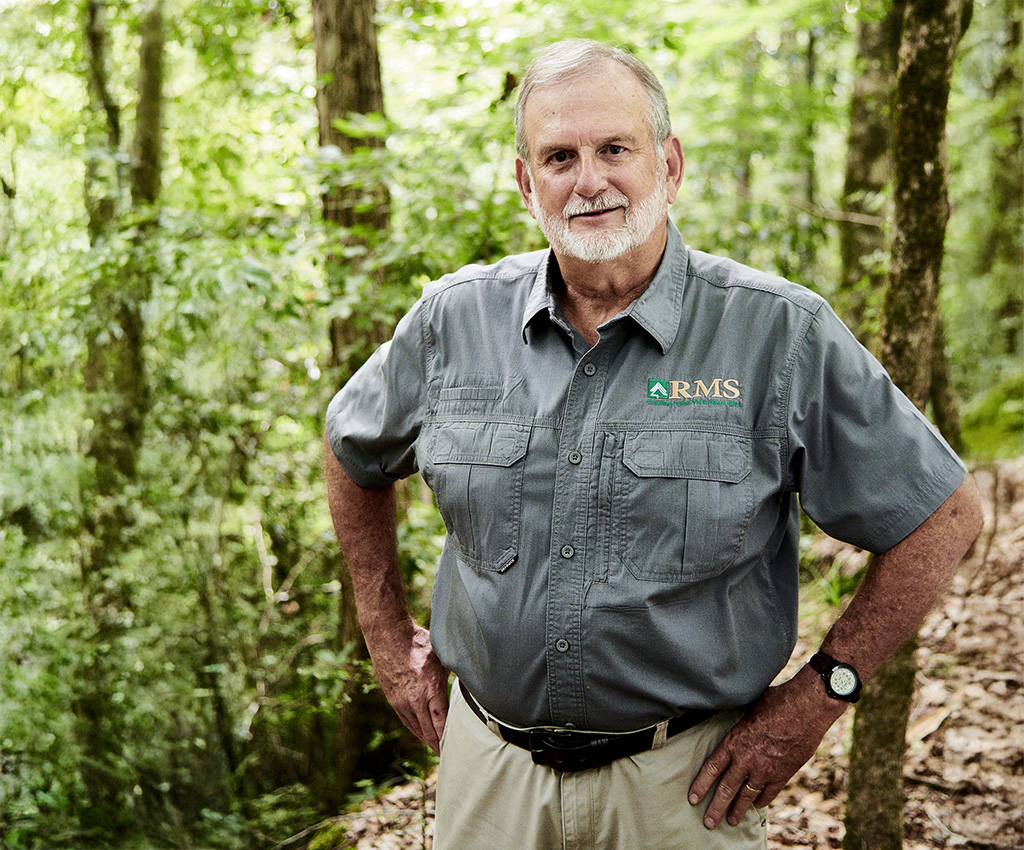
MSU alum merges profit with sustainability
Jimmy Bullock’s parents didn’t care where he went to college. He just needed to go.
He found the answer to “where” as a high school senior, while on a camping trip with his best friend Randy Spencer.
“We can’t really agree on who had the idea, but one of us said ‘Let’s go to Mississippi State and study forestry and wildlife’ and we both went,” the Bogue Chitto native recalled.
Bullock graduated from Mississippi State in 1980 with a bachelor’s degree in forestry and 1982 with a master’s degree in wildlife ecology.
During that time, Bullock discovered a passion for wildlife conservation and forest management that would serve as the backbone of his career ambitions.
“Being at Mississippi State helped me to learn how to think,” he said. “Adding one and one and getting two is not as simple as it seems. You want to think about what you’re doing and why, and also think about how the parts of the equation were formed and how the result will impact where you end up.”
Path to Conservation
After graduating, Bullock spearheaded numerous conservation efforts, including chairing the Louisiana Black Bear Conservation Committee, or BBCC, which made a major contribution to the restoration of the subspecies found in east Texas, Louisiana and the lower two-thirds of Mississippi.
Bullock said his approach to black bear conservation applied a lesson from the northern spotted owl which sparked legal battles between conservationists and forest landowners, when it was added to the federal list of threatened species. Instead of taking things to court when the Louisiana black bear was proposed for the list in 1990, he and the BBCC forged alliances to begin conservation efforts for the bear.
“A group of folks decided in the South, we could avoid the ‘timber wars’ between landowners and environmentalists,” he said. “We put together a grassroots effort called the Black Bear Conservation Committee. It was about how we could help conserve the bear and keep working forests working. I enjoyed trying to find ways to achieve conservation while allowing working forests and farms to continue to produce products essential to society without undue regulatory burden.”
That has been the crux of Bullock’s career—marrying two diverse and sometimes combative parties with two goals in mind: finding the best path for a healthy environment and conserving species in need of conservation while allowing landowners to be able to achieve their economic goals.
Serving in various roles, Bullock’s 18-year career leading the Sustainability Team of Resource Management Service, LLC, focuses on just that. RMS manages 2.4 million acres of private forestlands throughout the United States and Brazil, and Bullock is instrumental in advocating for conservation efforts within these lands.
He and his team often serve as a bridge between private landowners and regulators, aiming to find common ground where both the environmental and economic efforts can thrive.
Working with policy makers, state and national regulatory agencies, and serving as a national advocate for forestry issues that are germane to RMS-managed lands, Bullock continually makes strides in conservation. He helped pioneer conservation on private lands for a federally listed species, the Red Hills salamander in Alabama—coauthoring three habitat conservation plans that detailed ways to help recover the species.
Bullock’s work with the Red Hills salamander, which dates back to the mid ’90s, underscores his core belief that collaboration and communication play vital roles in the fight for conservation.
“It’s all about finding innovative ways to conserve species. Once we demonstrate successful techniques, other landowners can see the benefits and implement them,” Bullock said. “The National Alliance of Forest Owner’s Wildlife Conservation Initiative is one significant conservation milestone. Imagine 46 million acres of managed forests contributing to the conservation of species. The WCI has completely changed the perception of the importance of managed forests for conservation and has built a platform for trust between forest landowners and state wildlife agencies, the U.S. Fish and Wildlife Service, and other stakeholders.”
A legacy built on Maroon and White
With no set schedule, there’s no typical day for Bullock. The RMS Sustainability Team works on projects ranging from forest certification to advocating for policy changes in Washington, D.C.
“Forests are more than just growing trees,” he said. “They are natural solutions for climate challenges, they help sequester carbon and clean our air, they provide clean water and they conserve and enhance wildlife habitat and biodiversity. One of our most recent projects is really exciting, as we are demonstrating the biodiversity found in RMS-managed forests.”
Now 40 years into his career, Bullock has racked up numerous accolades, celebrating his progress in advancing conservation. He was named a 2024 Champion of Conservation by Garden & Gun magazine, earned the Quality Deer Management Association’s Joe Hamilton Lifetime Achievement Award, received the Wildlife Management Institute’s George Bird Grinnell Award for distinguished service in natural resource conservation and was the MSU College of Forest Resources’ Alumni Fellow in 2019.
As he nears retirement, he is excited to see what the next generation can offer and makes a point to devote time to mentoring up-and-coming conservationists.
“I am excited to be a part of developing innovative new strategies for conserving species,” Bullock said. “But, I’m more excited to watch the new generation that truly has this passion for conservation to pick up the mantle and run with it.”
He advises them to take a page from his book, noting that this simple approach is almost always the answer: communicate, collaborate and build a strong network based on trust.
“It’s a win for conservation and a win for the landowners,” Bullock said. “What’s really neat is the trust factor that’s being built up between landowners and the regulatory community, whether it’s state wildlife agencies or the federal agency. We trust each other enough that we’ll do the right thing. And we do.”
And Bullock is proud to say that MSU alumni have and are poised to continue having a big impact on these relationships moving forward, noting that regularly finds himself shaking hands with Bulldogs from across the country while in Washington, D.C. to discuss policy.
“The Mississippi State network of forestry and wildlife graduates is alive and well,” he said.
By Mary Pollitz, Photo by Stephen DeVries








